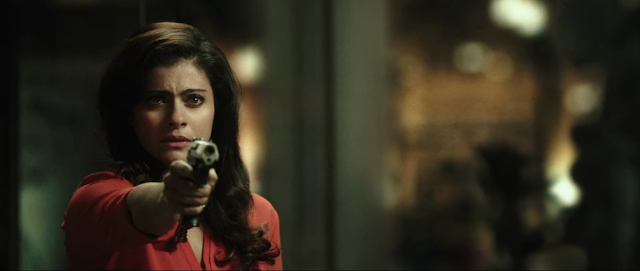Bada Dil Wala (1983) is the story of Amrit (Rishi Kapoor), a kind and trusting hotel singer, who is sent to prison for a crime he did not commit, framed by his dance partner Luska (Kalpana Iyer) and evil hotel security chief Bhagat Singh (Amjad Khan). Amrit vows to leave prison and prove his innocence. The first step in his plan is to . . . work hard and earn an early parole. Once that's sorted, and with the help of Luska's long lost sister Shabnam (Aruna Irani) he tricks the villains into confessing on tape. Unfortunately, Bhagat has a gun, and in the ensuing struggle, Luska is shot. And all of that happens within the first thirty minutes, with enough time for two dance numbers along the way. Things happen, is what I am saying. This movie has a lot of plot.
Amrit is afraid of being charged for Luska's murder, so he goes on the run. Luckily, the first person he runs into is his friend Vijay (Vijay Arora), along with Vijay's wife Juhi (Sarika) and their toddler Munna (Babloo.) Vijay delivers some important exposition about Juhi's father Sinha (Pran), who assumed that Vijay was after his money and refused to meet Vijay or even look at a picture of him, forcing the young couple to elope. Juhi sensibly sent her father a picture of his grandson, and they're all taking a train ride to reunite the family.
And then the train derails. Amrit manages to save little Munni, but Juhi and Vijay are not so lucky. Amrit takes the boy to Sinha, but the old man assumes that Amrit is Vijay, and before Amrit can explain, the family doctor takes him aside and explains that Sinha has a heart conditio0n and any further shock could kill him, so Amrit is forced to play along, tearfully reuniting with his friend's estranged father in law.
The bad news is that Sinha has another daughter, Rashmi (Tina Munim), and she has seen a picture of her sister's husband. She tries to bait Amrit into revealing himself, but he is well prepared thanks to all the backstory from the train trip. She finally confronts him , and he confesses everything, explains his motives, and shows her the letter he had written to Sinha to reveal the truth. Rashmi convinces him not to confess, both for her father's sake and because she's started to like him.
And so Amrit sticks around and tries to make himself useful. He keeps Simha happy and involved in family life, cleans up the corruption at the family juice factory, and grows closer to Rashmi. He can't bring himself to start a relationship with her, though, because he's an impostor and a wanted fugitive and everybody thinks he's her brother-in-law. It's enough plot for two movies at least.
And then Juhi shows up! With amnesia! Accompanied by a "doctor" who is actually Bhagat Singh in disguise! And the movie is only halfway over!
More than anything else, Bade Dil Wala reminds me of a penny dreadful, or an old black and white serial. Our pure-hearted protagonist careens from event to event at a breakneck pace. There's no time to explore anything in any great detail, or even catch a breath, but there is always something happening. It's pure melodrama, with action and romance and literal cliffhangers.
Melodrama only works if the cast is willing to commit, and the cast commits. Pran does most of the emotional heavy lifting; at times it seems that the only reason he's not in on the various secrets is so that he can react to the big reveals. Amjad Khan, most famous for playing the villainous Gabbar Singh in Sholay, is if anything even nastier here. Gabbar Singh, bad as he was, never tossed a baby off a cliff! Rishi Kapoor's Amrit is a charming innocent, while Tina Munim's Rashmi is the smart one with nerves of steel. There's a nasty villain to boo, and heroes to cheer for. What more could you ask for?
(Oh, and the baby is fine.)



























